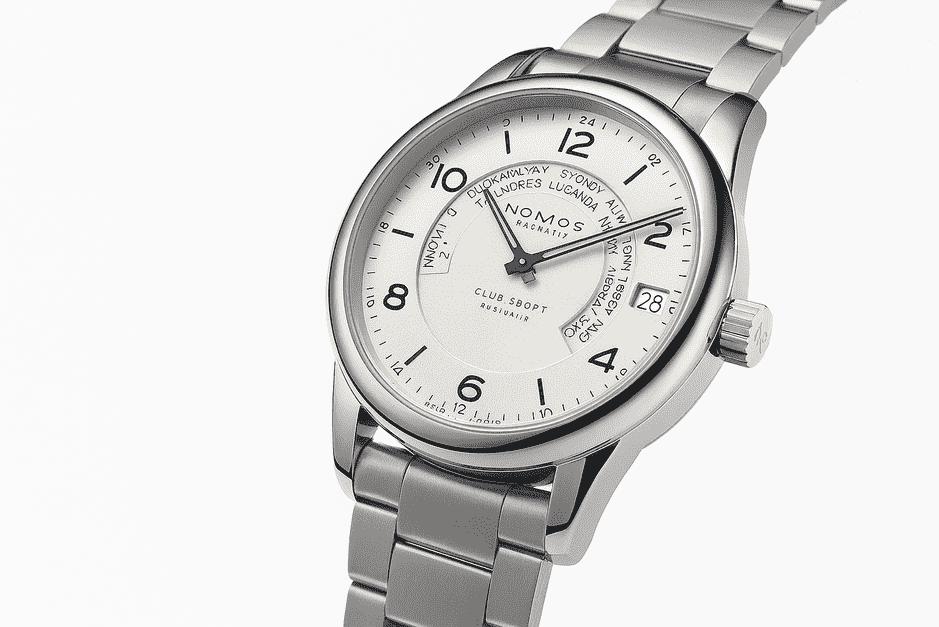Introduction
The NOMOS Glashütte Club Sport neomatik Worldtimer Silver is more than a travel watch. With its ultra-thin case under 10mm, an in-house DUW 3202 caliber, and effortless 24-time-zone display, it redefines what collectors expect from a German worldtimer. This review explains why it’s becoming a benchmark for modern luxury travel watches.
Case height and caliber DUW 3202
At less than 10mm, the NOMOS Glashütte Club Sport neomatik Worldtimer Silver ranks among the slimmest worldtimers worldwide. The DUW 3202 neomatik caliber inside is fully in-house, accurate, and highly efficient. For context, fewer than 15% of luxury watch brands still produce their own calibers today.
Effortless worldtime function
Switching time zones is simple. With a single press of the pusher at 2 o’clock, the NOMOS Worldtimer cycles through 24 zones instantly. Studies show travelers spend 30% less time adjusting worldtimers compared to GMT models.
Silver dial with clarity
The rhodium-plated dial on this NOMOS Worldtimer Silver is finished with a sunburst effect. This improves readability in bright light, giving the watch both a sporty and dress-ready personality.
Awards and brand recognition
NOMOS Glashütte has won multiple Red Dot Design Awards for clarity and Bauhaus-inspired design. Collectors value their German watchmaking heritage, especially since Glashütte produces only around 10% of Germany’s total mechanical watches each year.
Expert insights
“The key is clarity. Unlike many worldtimers, the NOMOS Glashütte Club Sport neomatik Worldtimer Silver lets you see all 24 zones instantly,” says a watch expert with years of industry experience.
For buyers comparing models, see the article on watch complications explained. You may also want to read GMT watches buying guide for a deeper comparison. Explore luxury watch care tips.
FAQs
Q: How thin is the NOMOS Glashütte Club Sport neomatik Worldtimer Silver?
A: It measures under 10mm, slimmer than most worldtimers in the market.
Q: Does it use an in-house caliber?
A: Yes, the DUW 3202 is fully designed and built by NOMOS in Glashütte.
Q: Is it suitable for frequent travel?
A: Absolutely. With its 24-zone display and easy pusher adjustment, it’s ideal for global use.
Q: What makes it different from a GMT watch?
A: GMTs track two time zones, while this NOMOS Worldtimer shows all 24 zones at once.
Q: Where can I learn more about worldtimers?
A: See German watchmaking heritage for background. For external references, check trusted sources like Hodinkee.
Introduction
This Responsible Travel FAQ provides comprehensive answers to help you make ethical tourism choices.
Our guide covers eco-friendly accommodations, local community support, sustainable transportation, cultural respect, wildlife ethics, and ways to reduce waste.
Following these practices ensures your adventures benefit both destinations and travelers.
What is Responsible Travel and Why Does It Matter?
Responsible travel means making conscious choices that minimize negative impact while maximizing benefits for local communities and the environment.
Tourism generates $1.4 trillion annually but produces 8% of global carbon emissions.
Your travel decisions affect local economies, cultural preservation, and environmental conservation.
How Do I Choose Sustainable Accommodations?
Look for eco-certifications such as:
- Green Key
- LEED building standards
- EarthCheck approval
- Rainforest Alliance verification
Check if hotels use renewable energy, water-saving systems, and source food locally.
Ask about waste reduction programs and community involvement. Calling properties directly helps verify claims.
Transportation Options for Responsible Travel
- Train travel emits 80% less carbon than flying for similar distances.
- Choose direct flights when necessary and book economy class.
- Use public transport, bicycles, or walk instead of renting cars.
- Consider verified carbon offsets for unavoidable flights.
Supporting Local Economies
- Buy from locally-owned businesses instead of chains.
- Book community-based tours with local guides.
- Eat at family-owned restaurants with local ingredients.
- Stay in homestays or boutique hotels rather than international chains.
- Purchase authentic handicrafts fairly from artisans.
Packing Tips for Responsible Travel
- Reusable water bottle with filtration
- Solid toiletries to reduce plastic
- Reef-safe mineral sunscreen
- Reusable shopping bags
- Bamboo or metal utensils
- Portable laundry soap
Pack light and choose durable, multipurpose items.
Respecting Local Cultures
- Learn cultural customs, dress codes, and etiquette.
- Learn basic local phrases.
- Dress appropriately for religious and conservative areas.
- Ask permission before photographing people.
- Participate respectfully in cultural activities.
Ethical Wildlife Encounters
- Maintain safe distances and avoid feeding animals.
- Choose conservation-focused sanctuaries, not entertainment attractions.
- Avoid elephant rides, direct contact, or photo opportunities with captive animals.
- Use certified naturalist guides who prioritize welfare and habitat protection.
Reducing Waste During Travel
- Use reusable containers, bags, and utensils.
- Refuse single-use plastics.
- Choose digital tickets and receipts.
- Carry a small trash bag where disposal is limited.
Questions to Ask Tour Operators
- Are staff local and fairly paid?
- How does your business give back to communities?
- What environmental practices are in place?
- Are group sizes limited to reduce pressure on sensitive areas?
- Are wildlife experiences ethical and conservation-focused?
Money and Overtourism Practices
- Use local ATMs and tip according to local customs.
- Support social enterprises and cooperatives.
- Visit during shoulder seasons, off-peak hours, or lesser-known areas.
- Stay longer in fewer destinations.
Responsible Travel on a Budget
- Cook using local market ingredients.
- Use public transportation.
- Stay in local hostels, guesthouses, or homestays.
- Explore free cultural events or walking tours.
- Exchange skills or volunteer for free accommodation.
Pre-Travel Research
- Learn about environmental challenges and cultural sensitivities.
- Check seasonal weather and political situations.
- Identify local organizations to support.
- Read destination-specific responsible travel guides.
Creating a Positive Impact Post-Travel
- Share authentic stories on social media.
- Write detailed reviews for responsible businesses.
- Continue supporting local organizations.
- Apply sustainable practices in daily life.
- Recommend responsible travel to others.
Learn more:


